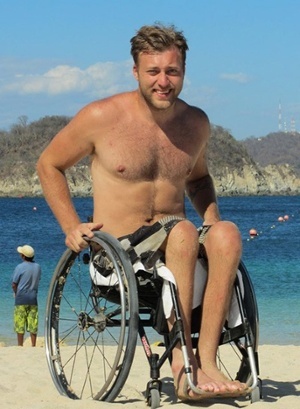
Traveling most often involves discovering exciting new things - about yourself and the world around you. And not least, returning home, invigorated and stimulated.
For several years, Sebastian Forsén has run Welltrips, a travel agency that specializes in trips for people with some form of disability. Sebastian himself has a spinal cord injury, and has traveled extensively.
"You broaden your perspectives, when you travel," maintains Sebastian. "And you grow as a person when you see that you can handle more than you think."
Sebastian will give us his best travel tips in two blog posts!
As mentioned, he himself has logged many miles now. He is unafraid of dense jungles or traveling in rusty cars on winding roads down high mountains. Sebastian's experience has been that most people are helpful, and with a little preparation, you can handle most anything.
The USA is a safe bet
The travel bug bit Sebastian when he traveled around the west coast of the USA with friends a few years after his injury. Suddenly, Sebastian realized that it was possible to do a number of things, despite the fact that he is in a wheelchair.
"That was the most fun I have had in my life!"
Traveling has been Sebastian's great passion ever since. His experiences include volunteer work in Mexico, trips to Cuba and several rehabilitation trips to Florida as an instructor under the auspices of Spinalis.
"The USA is always exciting. But it is particularly good for people with disabilities," states Sebastian. The Americans with Disabilities Act (ADA)* ensures that people with disabilities can travel practically anywhere in the USA.
The Olympic Games often guarantee accessible cities
What locations does Sebastian recommend, other than the USA?
 You can always rely on the Canary Islands. And cities that have hosted Olympic Games usually have accessible streets and modes of transportation: Barcelona and London, for example. Otherwise, Europe is a risky bet - conditions may vary widely between the countries, but Germany is pretty good, to give one example.
You can always rely on the Canary Islands. And cities that have hosted Olympic Games usually have accessible streets and modes of transportation: Barcelona and London, for example. Otherwise, Europe is a risky bet - conditions may vary widely between the countries, but Germany is pretty good, to give one example.
Preparation is key before venturing out. On his web site welltrips.com, Sebastian and his colleagues give tips on what to consider when booking a hotel and flight. They even have a search engine that lists handicapped-accessible hotels in various countries to make things easier for the visitor.
"It is also good to know all of the various abbreviations when you fly," says Sebastian. "For the sake of good order, you should call the company right before departure to confirm that they are prepared to provide the assistance needed."
Abbreviations that are good to know when traveling
WCHC (cabin)
The passenger is completely immobile, requires a wheelchair to and from the airplane, and must be carried up and down stairs and to and from the airplane seat.
WCHS (steps)
The passenger is not capable of getting up or down stairs, but is capable of getting to and from the airplane seat on their own. He or she requires a wheelchair to and from the airplane and must be carried up and down stairs.
WCHR (ramp)
The passenger is capable of getting up and down stairs, and capable of getting to and from the airplane seat on their own. He or she requires a wheelchair to and from the airplane.
All explanations appear on www.welltrips.com
For more travel tips from Sebastian Forsén, see his next article here at the Wellspect blog!
*= The Americans with Disabilities Act (ADA) was signed into law in 1990.
Are you using urinary catheters?
For more information about traveling with catheters, also read the blog post: What you need to know when traveling with catheters.
Or click the button to download a medical certificate for travels. This explains in ten different languages why you are carrying catheters in the luggage. Have a nice trip!




